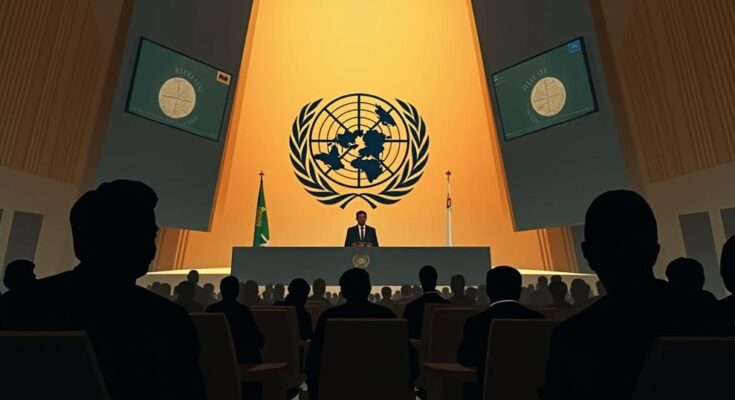At the UNGA, Indian Minister S. Jaishankar articulated India’s firm stance regarding Pakistan’s double game involving cross-border terrorism and its effects on the Indus Water Treaty. His remarks targeted Pakistan’s radicalization and underscored that future dialogues necessitate an end to terrorism. This marks a strategic shift in India’s diplomatic posture, promising a robust response to provocations from Pakistan.
In a powerful address at the United Nations General Assembly, Indian External Affairs Minister Subrahmanyam Jaishankar emphasized India’s resolute stance against Pakistan’s persistent double game regarding cross-border terrorism and its implications for Indian sovereignty. Jaishankar’s remarks were strategically timed as India has recently sought modifications to the 1960 Indus Water Treaty, highlighting the adverse effects of terrorism from Pakistan on India’s water rights and overall security. India’s initial notice to Pakistan regarding the treaty on August 30, 2024, has thus far gone unanswered, reflecting Islamabad’s continued deflection of responsibility. In response to aggressive rhetoric from Pakistani Prime Minister Shehbaz Sharif, who attempted to draw parallels between the situations in Gaza and Kashmir, Jaishankar countered with a direct critique of Pakistan’s governance and economic standing, stating that its GDP is now predominantly indicative of “religious radicalization.” He described the Indian government’s agenda as reclaiming territorial integrity while dismantling Pakistan’s militant frameworks. Jaishankar’s statements appear to represent a fundamental shift in India’s diplomatic engagement with Pakistan, indicating that future responses will no longer be constrained to minor diplomatic gestures but will instead be more robust and unequivocal. Furthermore, he articulated that the cessation of cross-border terrorism by Pakistan would be a fundamental precondition for any future dialogues. His comments underscore the Indian government’s awareness of Pakistan’s historical tendency to employ dialogue as a means of advancing its own nationalistic agenda without any substantial concessions. In conclusion, Jaishankar’s UNGA address confirmed India’s commitment to a strong policy against Pakistan’s duplicity while maintaining its sovereignty and security. With the impending visit to Pakistan for the SCO summit on October 15-16, the Modi administration demonstrates a renewed resolve to address terrorism and territorial claims head-on. This assertive diplomatic approach signifies a foreseeable shift in India-Pakistan relations, promoting a narrative in which Pakistan’s actions will no longer go unchecked, reinforcing India’s position on the global stage as a nation undeterred by provocations from its neighbor.
The article revolves around External Affairs Minister S. Jaishankar’s recent speech at the United Nations General Assembly, where he articulated India’s firm position on Pakistan’s longstanding issues related to cross-border terrorism, claims on Kashmir, and the implications of the 1960 Indus Water Treaty. The backdrop includes heightened geopolitical tensions, particularly in light of incidents that have historically escalated bilateral strife, such as the Indian Army’s operations in occupied Kashmir. Jaishankar’s comments came after India’s request for changes to the water treaty that governs the use of the Indus River system, asserting that Pakistani actions have hindered India’s utilization of water rights. The speech conveys a shift in India’s diplomatic tactics, indicating a readiness to respond firmly to provocations from Pakistan.
In summary, S. Jaishankar’s address at the UNGA highlights a significant moment in India’s foreign policy, establishing clear parameters around dialogue with Pakistan, contingent upon an end to cross-border terrorism. As tensions remain high, Jaishankar’s statements articulate a new assertiveness from India in addressing historical grievances, emphasizing that Islamabad’s past duplicity will necessitate an unyielding response from New Delhi. This evolving dynamic shapes the trajectory of future interactions between India and Pakistan, especially with the upcoming SCO summit on the horizon.
Original Source: www.hindustantimes.com




